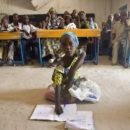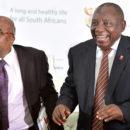The AU Panel Listens to Darfur
The AU Panel on Darfur has completed its fourth mission to Sudan, with the purpose of consulting a wide range of Darfurian and other Sudanese stakeholders about its possible recommendations on the three issues of peace, justice and reconciliation, and moving towards finalizing its report. A press release is available here: au-panel-listens-to-darfur
The picture shows President Pierre Buyoya and President Thabo Mbeki listening to villagers in an SLA-held village in North Darfur.






Dear Alex,
I have missed your informative reports from the earlier AU Panel missions to Darfur. Instead of that we have just the usual AU press release designed to say nothing, and say it too late to be of interest anyway. Nafie is leaking one thing and JEM is leaking something else. What’s going on?
regards, Jibreel
President Mbeki certainly set Khartoum abuzz in June. On June 25, almost one hundred CSO representatives gathered at al Burj al Fateh for a day long session with the AU Panel. Many came wondering if the event would be allowed to proceed at all, after the grievous disappointment of the cancelled Mo Ibrahim Conference in Addis Ababa just previously, or expecting the room to be packed with NCP supporters, or expecting that the agenda would be handled so that no-one really had an opportunity to speak. In fact the proceedings went on for the whole day and everyone who asked for the floor had the chance to speak. Nobody left frustrated, although the representatives could have talked the whole evening into the next day. Everybody I spoke to came away amazed and encouraged. It was really a breakthrough event and raised hopes sky high that there was really was an opening for civil society and democracy.
For twenty years we have been meeting outside the country, in Nairobi or London or Cairo. Inside Sudan itself small groups can meet and talk but it we are all divided into little pockets, not knowing each other. The Burj meeting with Mbeki was truly a breakthrough as it was the first time for so many of us to come to know each other as well as an opportunity for many people to speak their minds frankly. Not everyone said everything that was in his heart but enough was said for the NCP people there to look more and more outnumbered and demoralized.
In a meeting like that it is to be expected that many people will just take the chance to speak about what has been on their minds all these years, and of course some of the participants did this. It was helpful that the Panel sent around a questionnaire in advance that guided everyone’s thinking into four main questions, (a) Peace, (b) Justice, (c) Reconciliation/Healing and (d) Darfur and its role in Sudan’s national political scene. So much was said on each of these questions that I can not begin to summarize it.
The Burj meeting was a breakthrough, but what really gave us cause for hope was the closing words of President Mbeki. What he said was that he was going to go away, prepare his recommendations, and then come back and discuss them with the CSOs. He said “we shall meet again.†What he did not say was that the AU was going to come in and solve Darfur’s problems, which was as well because if he had said that no-one would have taken him seriously. What he did say was that the Sudanese people must solve this problem but the AU can help them do it. If Mbeki has the capacity to organize a meeting like the Burj Public Hearing then, perhaps he can organize the kind of all-inclusive national forum we have been longing for over 25 years.
This is a long-winded way of bringing me to my point. Mbeki and his team did indeed keep their promise and come back and they did talk to civil society and the lawyers and others in small groups, and those people they talked to are now reporting back to others and so on. They gave a strong indication of what they were going to recommend and asked everyone they interacted with for their reactions to the draft proposals, which covered the four areas asked about earlier. From what I have heard the discussions were substantive and a lot of the proposals that were put to Mbeki and his team first time round were included. For example, in the Burj meeting, CSOs demanded that they should be represented at the peace talks, and in Darfur CSOs said the same thing, and all the lawyers present expressed their lack of confidence in the Sudanese judiciary saying that it was not capable of trying cases of the magnitude of war crimes and was not independent either, and so at the absolute minimum some sort of hybrid court was needed. From what I hear all these recommendations were all taken on board by Mbeki.
And yet… all the AU can say about this process is this press release? My heart sinks.
I second the motion expressed by Jibreel Mohamed. As interesting as are the debates between or among interested parties outside Darfur, there seems to be little Intelligence emanating these days from Darfur itself. The AU news release releases no news. There must be a way, without prejudicing the outcome of the AU Mission’s deliberations, to report in a timely manner its progress and to explain events related to its visit. Is there any knowledgable person in Darfur now who reads this blog and is willing to bring us up to date?
I was in Burj Al Fatih on 25th June 2009, and witnessed what civil society activists were saying to the panel, in the issues of justice, peace and reconciliation. Every one agreed that justice is paramount. Dr Amin Makkie Madani gave us a lecture on the importance of pursuing international justice to bring the perpetrators of Darfur crimes to justice. As he clearly said, the Sudanese judicial system is not capable of doing that.
The panel has not yet published its findings, but I think they must reflect the opinions of all the people they listened to including civil society activists, IDPs, armed movements and others. We have been waiting for long and it is only few days before the publishing of the panel’s report. There is no point of pre-empting the report’s findings, so let us wait for it to come out and then we can comment on it .